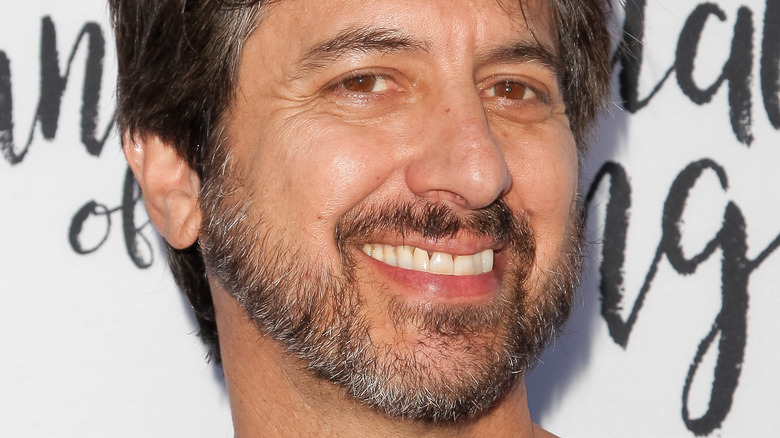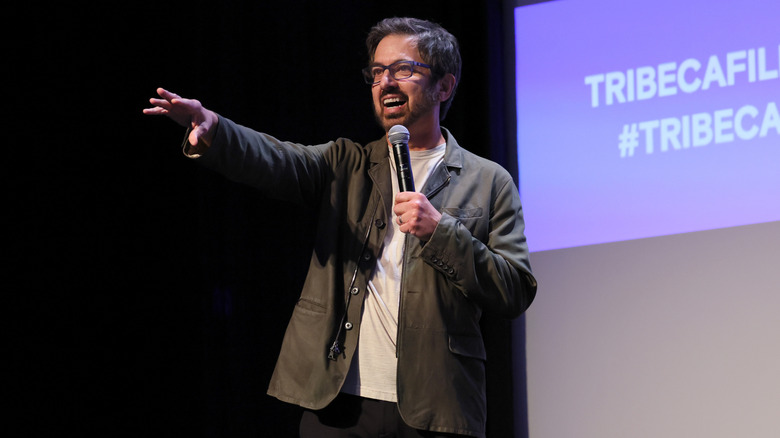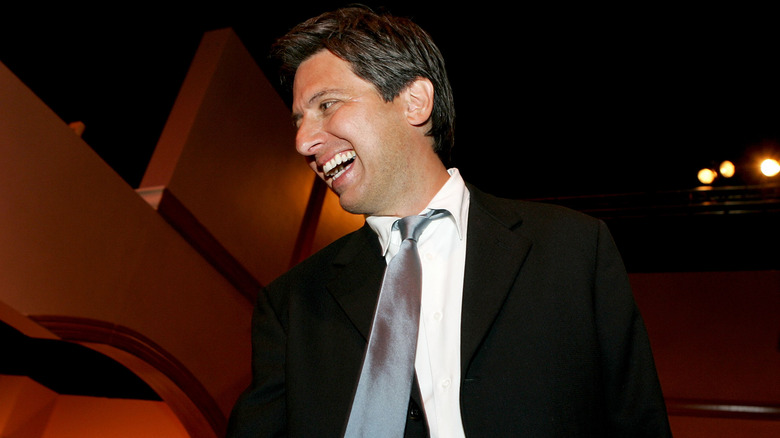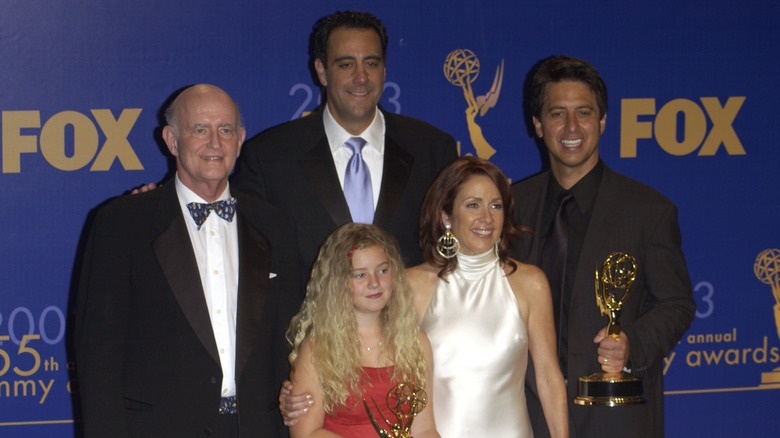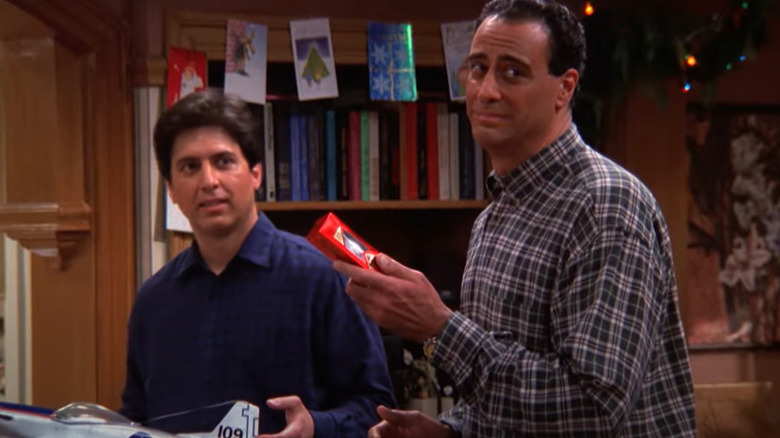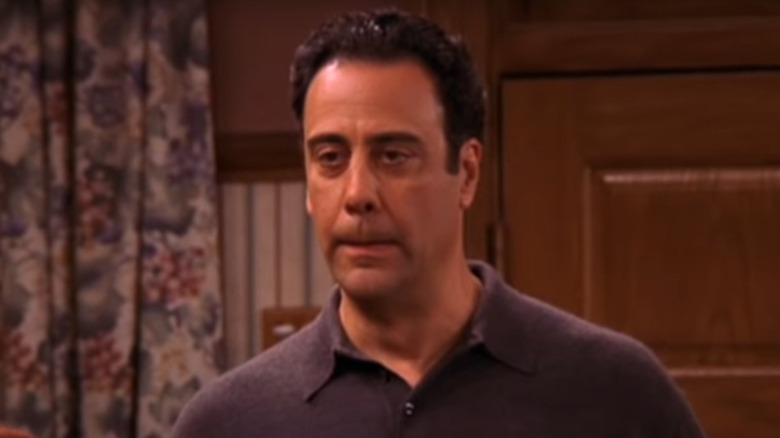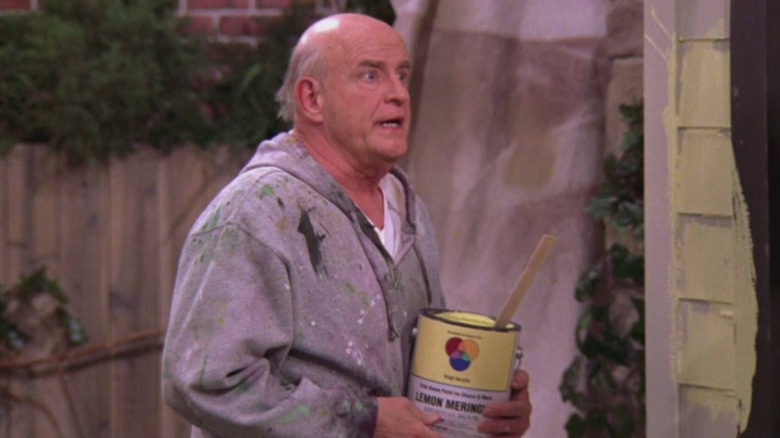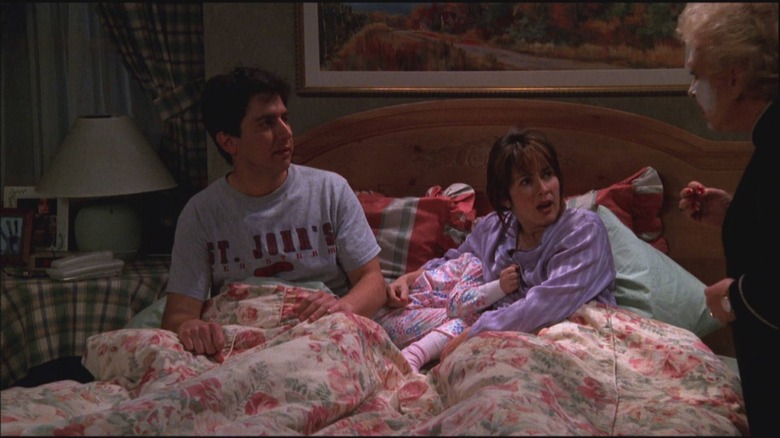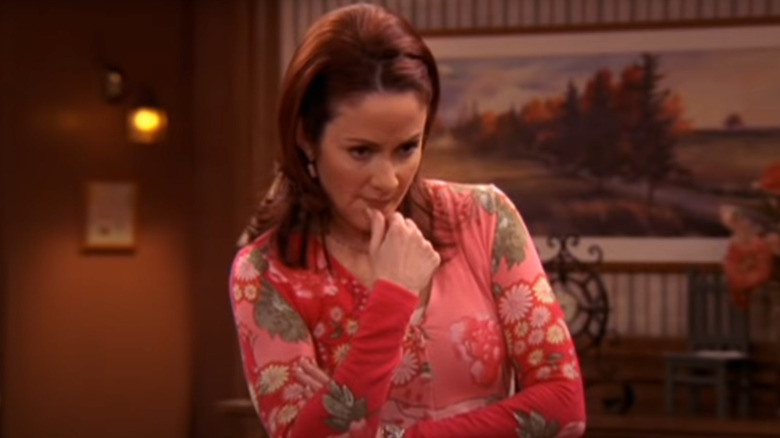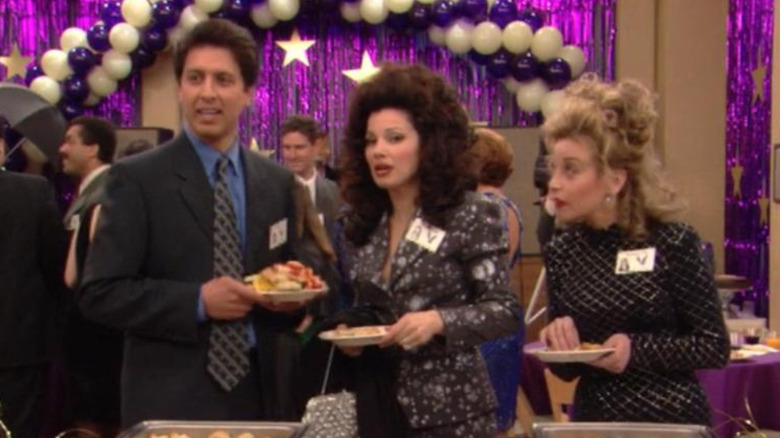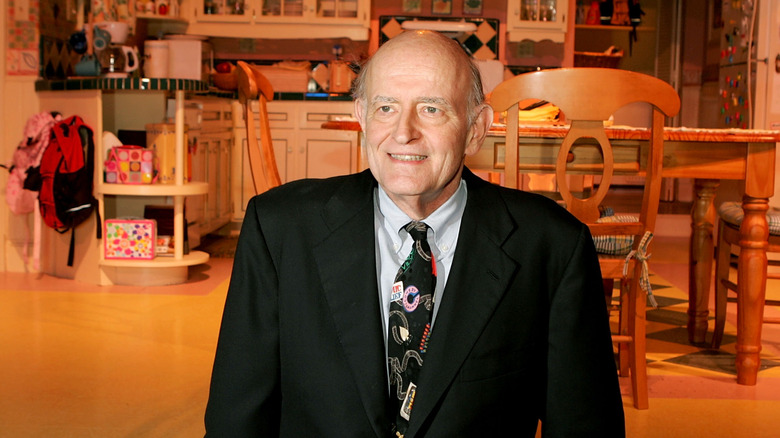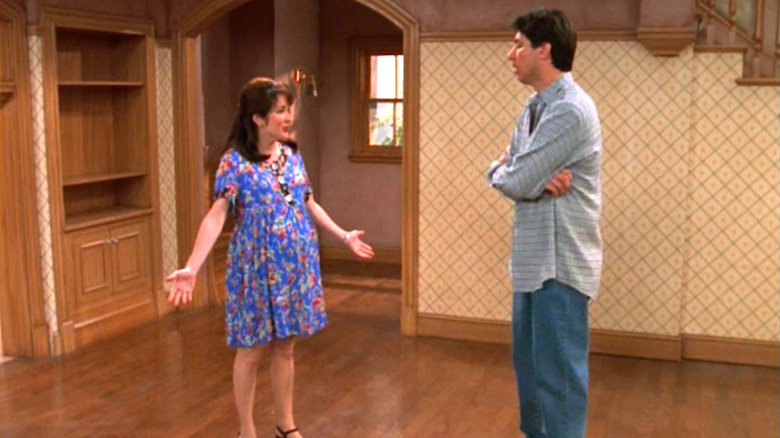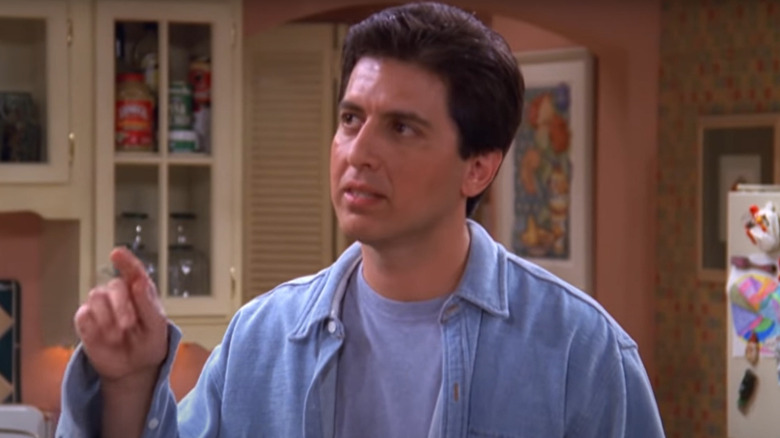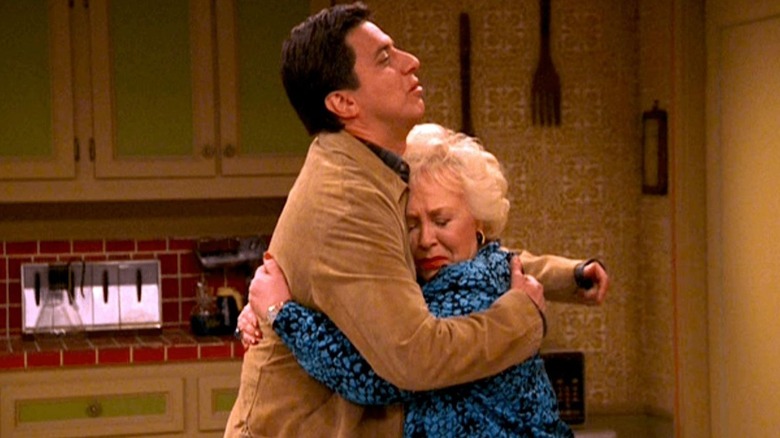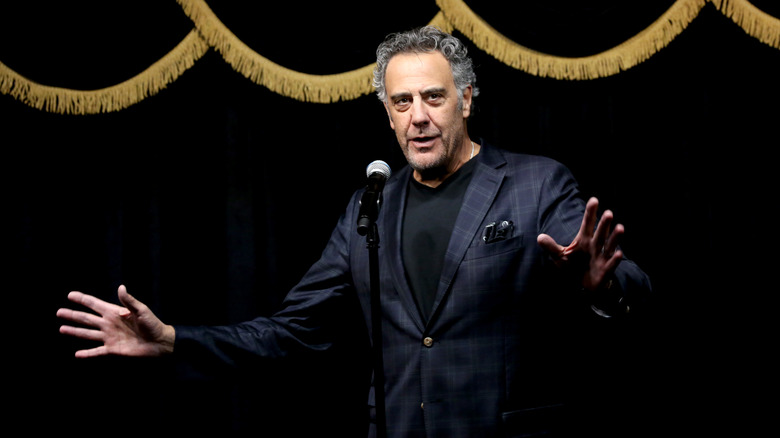The Untold Truth Of Everybody Loves Raymond
We may receive a commission on purchases made from links.
Some people consider the '90s the last golden age of sitcoms; a time when the genre dominated the television landscape, and there were a wide variety of sitcoms keeping viewers hooked on a nightly basis. While shows like "Seinfeld" and "Friends" were seen as the cool kids of the sitcom family, "Everybody Loves Raymond" offered a more wholesome approach to the genre.
The series takes a look at the fictional life of sportswriter Raymond Barone (Ray Romano), who lives with his wife Debra (Patricia Heaton) and children in the suburbs of Long Island. While Raymond lives an idyllic life most of the time, the fly in the ointment is the presence of his parents and older brother Robert (Brad Garrett), who live on the same street and make a habit of dropping into Raymond's home unannounced.
Over the course of nine seasons, audiences follow Raymond in his daily struggle to keep the peace between his fiery wife and his progenitors while Robert tries to contain his jealousy over Raymond having a more successful life than he does. "Everybody Loves Raymond" was a huge hit with general audiences and drew critical acclaim during its near-decade-long run. Let us take a look at some of the lesser-known details about the show's creation and execution.
It's inspired by Ray Romano's standup
In the '90s, a whole lot of standup comedians got deals to create their own shows for network television from executives who were actively on the lookout for promising new comedians who could connect with general audiences. This led to the launching of several successful shows like "Seinfeld," "Home Improvement," and "Roseanne."
At the time, "The Late Show with David Letterman" was well known for giving new standup acts a space in its special performance sections. Ray Romano had been working as a standup comic for more than a decade when he was invited to perform for Letterman on his show. The resulting gig was received well by the show's audiences, and also caught the attention of producer Rob Burnett and Letterman himself.
"I did five or six minutes of material [on the Letterman show]," Romano recalled in an interview with the news outlet Cleveland. "Following that show I got a call from Rob Burnett at Worldwide Pants [studios] saying that Dave liked my act and that he was interested in pursuing a development deal for a television sitcom." And so, Romano was put in charge of developing his very own sitcom that would eventually be regarded as a classic staple of the '90s and early 2000s.
The story behind the title
With a title like "Everybody Loves Raymond," you are setting your audience up with some major expectations. Folks who don't understand irony and take everything literally will likely expect the character of Raymond to be a god among men — an intensely charismatic individual who inspires love and devotion from everyone he meets.
Of course, the truth of the show is Raymond Barone is an intensely average guy and the title of the show is a tongue-in-cheek reference to his inability to please everyone all the time. While Ray Romano co-created the show and plays the title character, the self-aggrandizing title was not his idea — in fact, it was inspired by a remark from his daughter.
When Romano was still developing his show, he was hunting for a title. One day, after drawing a blank several times, Romano was playing with his then-5-year-old daughter. "I say to her, 'Do you love me?' You know, just in a playful way," Romano recalled in an interview with the Los Angeles Times. "And she goes, 'Of course, I love you. Everybody loves Raymond.'" As soon as he heard the phrase, Romano called his manager and declared he had found the title for his show. Interestingly, Romano's real-life brother Richard has claimed in a different interview that he was the one who inspired the title of the show through a joke he made to his brother.
Oddly enough, Romano really hated the title
"Everybody Loves Raymond" is one of the most memorable sitcom titles of all time. So much so that it even became the inspiration for multiple sitcoms from subsequent years including "Everybody Hates Chris" and others. But "Everybody Love Raymond" is also a pretty presumptuous title, especially when Raymond is played by and loosely based on the creator of the show himself.
Ray Romano was acutely aware of how his show's title would sound to audiences, and even though he had a hand in creating the idea, he started to regret it. "I really hated the name of the show," Romano admitted in an interview with Cleveland. The problem was that Les Moonves, the since-disgraced former head of CBS who was producing the show, really loved the title. But Romano could not help but dread how reviewers would react to such a title if the show did not end up doing well.
"When you take the phrase 'Everybody Loves Raymond' out of that context of being self-deprecating it just opens you up to criticism," Romano explained in the same interview. "I could already see the headlines on reviews, like 'I guess not EVERYBODY loves Raymond.'" Romano even tried to get executive producer David Letterman to intercede on his behalf and get the title changed. But the studio forged ahead, and Romano's fears were alleviated when "Everybody Loves Raymond" became a critical and commercial hit.
It's the opposite of Seinfeld
For younger audiences, it can be hard to imagine just how influential "Seinfeld" was for the sitcom genre as a whole. Plenty of new sitcoms that came after it tried to follow the "Seinfeld" blueprint to some extent, with "Friends" and "It's Always Sunny in Philadelphia" standing as the most successful among the offspring of "Seinfeld." As it turns out, "Everybody Loves Raymond" was also influenced by "Seinfeld" in a major, albeit inverted way.
In an old interview, "Everybody Loves Raymond" co-creator Phil Rosenthal recalled meeting Ray Romano for the first time and brainstorming ideas for what his TV show could be about. "I think [Romano] wanted to do a show about a comedian who sits in a coffee shop and talks to his friends about current subjects," Rosenthal recalled. "I was like, you know there is [already] that show. 'Seinfeld' was a big hit. You can't be ['Seinfeld']."
With this crucial bit of feedback, Romano's show moved away from trying to be like "Seinfeld" and found its own identity. "[Unlike Seinfeld], I wanted to avoid topical humor and concentrate on things that have lasting value," Rosenthal explained in a separate interview with Yahoo. And so instead of being a coolly detached show about nothing in particular, "Everybody Loves Raymond" became about the family ties that bind people in their 30s, 40s and beyond.
Robert started out very differently
While Ray Barone is firmly at the center of "Everybody Loves Raymond," he is meant to be the regular everyman the audience can relate to; it's his family members who add the necessary quirks and wackiness. Chief among them is Ray's older brother Robert, the perpetually gloomy sibling who wants everything that Ray has in life.
The dynamic between Robert and Ray and their parents provides the comedic bedrock for the rest of the show. Ray Romano and Brad Garrett, who plays Robert, share a wonderful chemistry that makes the affection between their characters obvious at all times, even while the duo bicker and snipe at each other endlessly. It is difficult to imagine anyone but Garrett portraying Raymond's giant, morose brother. But the show's creators initially had a very different idea for what Robert should be like.
"[The showrunners] wanted a Danny DeVito-type to play Ray's brother," Garrett explained in an interview. "They wanted someone scrappy, and kind of like a little bulldog nipping at Ray's heels all the time." After reading the script, Garrett asked for a chance to play the character in the opposite manner, as "a big, beaten down guy" who is used to coming in last. The makers of the show were impressed enough with Garrett's take on the character to give Robert a complete image overhaul.
Peter Boyle scared the producers into giving him Frank
After Ray Romano and Phil Rosenthal knocked together the blueprint for "Everybody Loves Raymond," it was time to start casting the roles. One role that proved particularly tricky was Raymond's irascible father Frank, prone to fits of rage and bitterness at the drop of a hat.
As it turns out, Peter Boyle was able to land the role of Frank partially due to a series of real-life mishaps that left him feeling very much like Frank at his most irritable during the audition. "[My family and I] had trouble getting on the studio lot," Boyle recalled when asked about his audition. "They didn't have the proper information." The actor goes on to explain that after he finally learned where the audition was being held, he discovered that the location had changed.
Naturally, Boyle admits the poor management of the whole affair left him feeling "grouchy" when it was finally time to give his audition, which ended up helping him. "He came in all hot and angry," the show's co-creator Phil Rosenthal told The Hollywood Reporter during an interview commemorating the actor's passing, "I hired him because I was afraid of him," while also noting, "I knew right away that he had a comic presence."
Playing it close to real life
One thing that makes "Everybody Loves Raymond" feel so much more authentic than other sitcoms is that it feels grounded in reality. You always get the feeling that you are watching something that could happen in any suburban household, albeit dialed up to 11.
This sort of grounded absurdity was no accident, but something that the makers of the show consciously set out to do. In an interview with the Los Angeles Times, co-creator Phil Rosenthal explained that he decided to keep the setting for "Everybody Loves Raymond" as close as possible to Ray Romano's real life, because Romano's personal life was "funnier than anything he could have dreamed up." Also, Rosenthal didn't want relative newbie actor Romano to have stretch himself too much trying to play a completely different personality.
In the same interview, Romano stated that his real-life family, who all inspired the characters of Debra, Robert, Marie, and Frank to some extent, enjoyed seeing their television counterparts cause mayhem on the show. The fact that the people on the show so closely resemble people in the real world ultimately helped separate "Everybody Loves Raymond" from other sitcoms containing more over-the-top characters.
War almost broke out over casting Debra
After creating the narrative nuts and bolts of what would become "Everybody Loves Raymond," co-creators Ray Romano and Phil Rosenthal had the task of casting the central characters. The creators and the network had conflicting visions for Raymond's wife Debra, and arguments over the casting got pretty heated. Whereas Rosenthal wanted an actress who could look like a plausible late 30-something middle-class suburban mom, the network wanted to go in a more Hollywood direction.
"CBS wanted someone hotter to play Debra," Rosenthal explained in an interview with Yahoo, adding that he felt so strongly about the matter that he "almost quit the show over [casting the actress the network wanted]." CBS convinced Rosenthal to at least meet with the actress they had in mind for Debra, but Rosenthal knew as soon as he spoke to her that the actress was not right for the part.
When Rosenthal went to meet the network executives to tell them he could not work with that actress in Debra's role, he was convinced he would be fired for taking a stand against the network's wishes. Fortunately, the execs allowed Rosenthal to keep searching for the right actress. "Two weeks later, [Patricia Heaton] walked in and within five minutes she had the part," Rosenthal recalled in the same interview. "When it's right, it's right, and you know it immediately."
The connected universe
Cinematic universes are all the rage in movies these days, but TV shows airing on the same network had been crossing over with strategic guest appearances for decades before anybody thought Robert Downey Jr. could play a superhero. Having crossed over with "The King of Queens" and "The Nanny," "Everybody Loves Raymond" is a crucial part of CBS's shared '90s sitcom universe.
In the episode "The Reunion Show" from "The Nanny," Raymond Barone meets the show's main character Fran Fine, famously played by Fran Drescher, and it is revealed that the two went to high school together. This is a reference to the fact that Ray Romano and Drescher were real-life high school compatriots. Kevin James was a writer for "Everybody Loves Raymond," and when he got his own show, "The King of Queens," they had plenty of crossover episodes with "Everybody Loves Raymond."
Additionally, the episode "Lucas Raymondicus" of "Cosby" features a guest appearance by Raymond Barone and his father Frank. Raymond also makes an appearance in an episode of "Becker" entitled "Drive, They Said." That means, by extension, "Everybody Loves Raymond" exists in a shared universe with "Cheers" and "Frasier."
A terrible secret
If Ray and Debra are the glue that holds "Everybody Loves Raymond" together, Ray's parents Frank and Marie are the plaster surrounding that glue. Frequently annoying and intrusive, Marie and Frank nevertheless play an important role in maintaining the status quo of the series with their devotion to Ray, Debra, and Robert.
On the show, Marie and Frank are constantly at each other's throats, even though it was repeatedly proven that the two had a great deal of affection for each other buried beneath years of resentment thanks to their long-married life. The actors who played them, Peter Boyle and Doris Roberts, had a far better relationship off-screen, to the extent that Boyle came to Roberts for advice about whether he should tell the rest of the cast about his cancer diagnosis.
"He told me he had cancer of the bones three years before he died," Roberts told the LA Times. "He said, 'Should I tell them?' I said, 'No. They will treat you like a dying man and you don't need that. You need for them to write for you.' We had such fun together." One year after "Everybody Loves Raymond" ended, Boyle finally succumbed to the disease at the age of 71.
Hiding two separate pregnancies
In a lot of ways, Raymond Barone and his wife Debra are the quintessential sitcom couple. Ray means well but gives in easily to other people's demands, leading to many humorous situations, while Debra always stands her ground and helps rescue Raymond from whatever issue he happens to be failing to deal with.
But there came a time when the problem faced by Debra could not be solved with her husband's help. Patricia Heaton discovered she was pregnant while on the show on two separate occasions. As she was one of the main characters, taking Debra off of the show while Heaton went through her 18 months of pregnancy was not an option.
"I have four kids, and the first and third seasons [of Everybody Loves Raymond] I was giving birth to two of them," Heaton explained in an interview with the New York Post. "So I was going through surgery and then right back to the show." Apart from the personal toll taken on the actress' body and mind, the showrunners had to find creative ways to film Debra during her scenes to hide any evidence of an unexplained baby bump.
The show almost ended before it began
Today we know "Everybody Loves Raymond" as one of the most successful sitcoms ever produced. The series made stars out of its lead cast of then-unknown actors, and even made Ray Romano the highest-paid television actor of the time. It is strange to consider that such a successful show did not start off with a bang, but very nearly a death knell.
The truth is the first season of "Everybody Loves Raymond" was not exactly a berserker in the ratings. "There hadn't been a hit in [our first season] time slot since Gomer Pyle," co-creator Phil Rosenthal told AV Club. "And we didn't change that, but the three people that watched the show did come back every week." Faced with a tough sell to larger audiences, Rosenthal found a friend in CBS head Les Moonves, who liked the show enough to tell him, in Rosenthal's words, "'Now, we're gonna give you a chance here, six episodes. But if you don't perform here, I can't help you anymore.'"
Fortunately, ratings began to pick up shortly afterward. According to Rosenthal, this prompted a different type of anxiety for him and Ray Romano, since they were afraid they would not be able to sustain the audience's interest. Fortunately, that fear proved unfounded, as "Everybody Loves Raymond" kept going stronger in terms of ratings with each new season.
Not outstaying its welcome
In 2005, "Everybody Loves Raymond" came to a close with its ninth and final season. While the series was popular enough to keep chugging along, its creators decided they had told all the stories they wanted to about the Barones.
"We ran out of ideas," Phil Rosenthal stated in an interview with AV Club. "We also wanted to get off the air before somebody said, 'Hey, you should go off the air.'" According to Rosenthal, it was important for him and the cast of the show to end their time on the air while they were still welcomed with open arms by audiences because, "We actually cared enough about our audience to want to go before we became lousy."
Naturally, fans were not very happy to discover "Everybody Loves Raymond" would be coming to an end. But the series did go out on a high note with a finale that is considered one of the best episodes of "Everybody Loves Raymond."
The tell-all book
Since "Everybody Loves Raymond" became popular before the age of social media, fans' access to their favorite stars from the series was comparatively limited. But you can take a closer look at the way its performers dealt with the day-to-day work of "Everybody Loves Raymond" thanks to Brad Garrett's tell-all book, "When the Balls Drop."
In it, Garrett reveals that he did not initially think Ray Romano was the right choice to lead the show. "I met Raymond and promptly felt that we were doomed," Garrett wrote in his book. "He looked like the teenager you would see at Whole Foods spraying down the produce... I wanted to flee like a hooker in church." Fortunately, Garrett's suspicion proved to be unfounded. As the cast got into a familiar routine with each new season, Garrett recalled other anecdotes from that time period in his book.
One particular problem for Garrett had to do with Peter Boyle's habit of letting out lots of flatulence during filming. Additionally, Garrett claims that Doris Roberts, who played his mother Marie on the show, "was the only cast member who could outdrink me" despite her being 70 at the time of the show's premiere.
